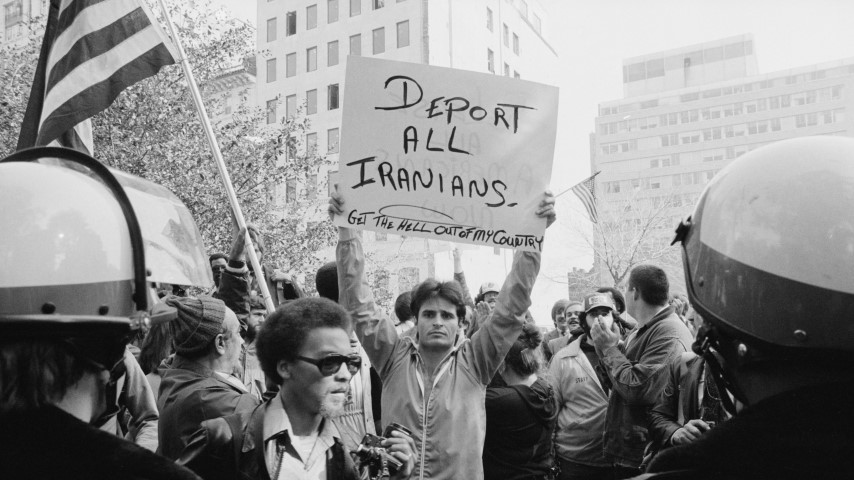American Empire: The U.S. Has Wanted War in Iran for a Long Time
Marion S. Trikosko, Public domain, via Wikimedia Commons
This is American Empire, Splinter’s rolling series of articles exploring the power of the United States and the different ways it unleashes it upon the world. Read our other entries here.
Will the United States be dragged into another war in the Middle East? This has become the burning question of our time: might America, beholden to the whims of Israel, be forced, unwillingly, to step in on the side of its ally to face down Iran, with the possible consequence of sparking World War III and a nuclear apocalypse? It is a sickening prospect, to be sure, but the term “dragged” seems to be doing rather a lot of work there.
Over the course of the last year of perpetual Israeli atrocities, the U.S. has provided its ally with billions of dollars in military aid while bombing the Houthis in Yemen in defense of Israel. It has sent over horrifyingly powerful bombs, artillery shells, tank rounds and small arms to be used against, among others, thousands of children. It has deployed several thousand more of its own troops to the region, provided intelligence to Israel, and the U.S. has spread Israeli lies and propaganda at every turn. America repeatedly blocked demands for a ceasefire at the United Nations while trying to redefine the term ceasefire.
The United States has not been “dragged” into anything. It has been a willing partner in this spiraling war since day one, fought against Iran’s proxies in Gaza and Lebanon.
But things can get worse. The drums of war are beating, as the neocons, having once again found their confidence, are stirring shit more vigorously, calling for war in a faraway place they know nothing about. “We absolutely need to escalate in Iran,” as the headline of a recent Bret Stephens op-ed in The New York Times put it, elucidating the thinking of hawks on both sides of the aisle, Democrat and Republican alike. These bloodthirsty freaks, so detached from the death that war actually entails, fantasize about “reshaping the Middle East,” destroying Iran as we know it and creating a new state to America’s, and Israel’s, liking. Maybe this time, unlike in Iraq or Afghanistan, it may work?
The toppling of Iran’s theocratic regime would, in the minds of such dead-eyed imperialists, right the supposed wrongs of America’s failure to deal with the Islamic Republic since its founding. The two nations have long been sworn enemies, doomed to a cycle of animosity which may come to overwhelm the Middle East and possibly the world, but it wasn’t always so. There was a time when a previous Iranian regime was the darling of U.S. leaders.
Shah Mohammed Reza Pahlevi came to power in Iran in 1941. Sitting at the top of a constitutional monarchy, he enjoyed a great deal of power, but was tempered somewhat by an active parliament. The Shah was viewed as a vital ally by the Truman administration, who, within the context of the coming Cold War, coveted a friend in the region to resist the Soviet Union.
But he came to be despised by his own people. The Shah allowed Iranian oil to fall under foreign control, selling it to companies from abroad, most notably the Anglo-Iranian Oil Company, which we know today as BP. The company grew fabulously rich by extracting and exporting Iran’s oil, and, while it did pay royalties to the Iranian regime for the privilege, it paid more in taxes to Britain, which relied on its colonial plunder to help construct its post-war social welfare state.
The Shah’s naked betrayal of his people led to the rise of Mohammed Mossadegh, who, in 1949, was elected prime minister on the promise of nationalizing the Iranian oil industry. The British, and their American allies, were not pleased when he actually followed through, and they began to plot his downfall. The countries’ respective foreign intelligence services, MI6 and the CIA, organized a coup against Mossadegh’s elected government, bribing people to cause unrest on the streets and allow a right-wing general, Fazlollah Zahedi, to seize control of the government. Mossadegh was deposed, Zahedi installed as prime minister, and the Shah empowered to rule as a dictator.
-

-

-

-

-

-

-

-

-

-

-

-

-

-

-

-

-

-

-

-

-

-

-

-

-

-

-

-

-

-

-

-

-

-

-

-

-

-

-

-

-

-

-

-

-

-

-

-

-

-

-

-

-

-

-

-

-

-

-

-

-

-

-

-

-

-

-

-

-

-

-

-

-

-

-

-

-

-

-

-

-

-

-

-

-

-

-

-

-

-

-

-

-

-

-

-

-

-

-

-

-

-

-

-

-

-

-

-












































































































